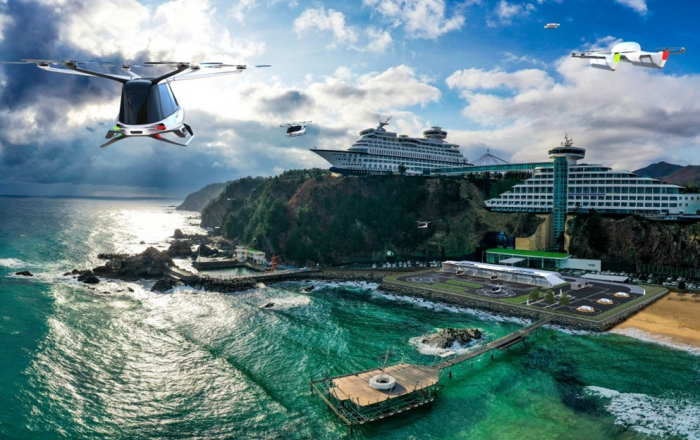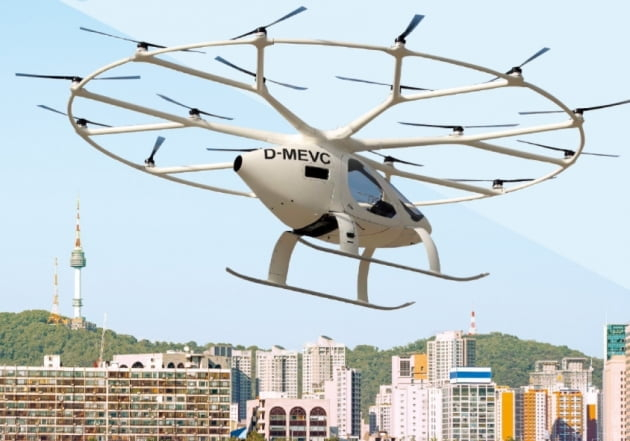Why Samsung didn't join race for S.Korea's air taxi project
Samsung is the only one out of the country's top five business groups not to bid on the government-run UAM program
By Jun 02, 2022 (Gmt+09:00)
LG Chem to sell water filter business to Glenwood PE for $692 million


Kyobo Life poised to buy Japan’s SBI Group-owned savings bank


KT&G eyes overseas M&A after rejecting activist fund's offer


StockX in merger talks with Naver’s online reseller Kream


Mirae Asset to be named Korea Post’s core real estate fund operator



Samsung, a name seen everywhere in South Korea from apartment complexes to home appliances, is missing on the list of bidders for the country’s first government-run project to establish standards for the validity and safety of flying cars, or urban air mobility (UAM).
The country’s top business group with assets of $400 billion is the only one out of the top five conglomerates in South Korea to not join the race for the government program titled K-UAM Grand Challenge.
The other top five groups -- SK, Hyundai Motor, LG and Lotte -- have each forged consortiums to raise their chances of winning the competition as the government is preparing to commercialize air taxi services from 2025.
Samsung might be going against the trend toward the next-generation transportation vehicle, which the retail-focused Lotte Group picked as one of its two priority areas alongside biotechnology for the next five years.
But the world's top memory chip and smartphone maker seems steadfast in its determination not to dip its toes back into the automobile or transportation business since its humiliating withdrawal from the car business in 2000.
The Ministry of Land, Infrastructure, and Transport will allow all the bidding groups to conduct feasibility tests on the new type of vehicle in the first round of competition and then disqualify some of them in the second round, according to sources familiar with the matter.
“Since Samsung Electronics had made public that it won’t touch the automobile business, mobility seems to be left off its priority list,” an industry insider said.
“Instead of entering new businesses, Samsung will focus on widening its gap with memory chip competitors and enhancing competitiveness for the system on chip and foundry businesses.”
After six years in the loss-making automobile business, Samsung pulled out of the market in 2000. It is now seeking to sell off its remaining 19.9% stake in Renault Samsung, dropping Samsung from the joint venture’s name.
FOCUS ON CHOICES
Back in 2018, Samsung flatly denied market speculation that it could restart the automobile business. In an internal announcement, Samsung Electronics assured its employees that it neither had a plan to resume the automobile business, including electric vehicles and driverless cars, nor to acquire an automaker.
“We remain determined to focus on semiconductors,” the company said at the time.
According to sources familiar with the Samsung Group, Samsung Electronics, the group's key cash cow, and other units have not discussed details of a possible entry into the UAM sector.

FOUR BIDDING GROUPS
SK Group has joined hands with companies outside of the group to increase its chances of winning the race. With SK Telecom Co. at the forefront, the group will also attract chipmaker SK Hynix Inc., battery manufacturer SK On and investment unit SK Square Co. to the project.
LG Group launched a consortium led by LG Uplus Corp., a wireless and internet service provider, last month. LG Electronics Inc., battery maker LG Energy Solution Ltd. and the group's R&D unit LG Science Park are among the companies to engage in the service.
GS Group, spun off from LG Group in 2005, also joined the LG Uplus-led consortium. GS Engineering & Construction Corp. will be in charge of building vertiports, where the UAM vehicles can make vertical takeoffs and landings. GS Caltex Corp.'s gas stations will be used as their charging stations.
For the Hyundai consortium, Hyundai Motor will develop and commercialize UAM aircraft, while conducting test flights.
Hyundai Engineering & Construction Co. will design and construct vertiports and mobility hubs that will connect UAM to ground transportation. It plans to build the country's first UAM vertiport in the heart of Seoul.
Lotte Group mobilized its construction, rental and telecommunication units to bid for the UAM project. The country's fifth-largest conglomerate has suggested it could utilize its offline networks for UAM, from retail stores to cinemas and hotels as vertiports.
The South Korean government is also planning to launch a 1.6 trillion won ($1.3 billion) project to set basic standards and guidelines on air taxis, in the absence of global standards for the future mobility service.
Air taxis are expected to reduce traffic congestion and greenhouse gas emissions and their market is forecast to reach $1.5 billion in value by 2040, according to Morgan Stanley.
(Updated on June 7 to correct the sixth sentence. The Ministry of Land, Infrastructure and Transportation has yet to decide on whether to select a single consortium or plural groups to set guidelines and standards for the UAM.)
Write to Han-Gyeol Seon at always@hankyung.com
Yeonhee Kim edited this article.
-
 Business & PoliticsTrump Jr. meets Korean business chiefs in back-to-back sessions
Business & PoliticsTrump Jr. meets Korean business chiefs in back-to-back sessionsApr 30, 2025 (Gmt+09:00)
-
 Korean chipmakersSamsung in talks to supply customized HBM4 to Nvidia, Broadcom, Google
Korean chipmakersSamsung in talks to supply customized HBM4 to Nvidia, Broadcom, GoogleApr 30, 2025 (Gmt+09:00)
-
 EnergyLS Cable breaks ground on $681 mn underwater cable plant in Chesapeake
EnergyLS Cable breaks ground on $681 mn underwater cable plant in ChesapeakeApr 29, 2025 (Gmt+09:00)
-
 Business & PoliticsUS tariffs add risk premium to dollar assets: Maurice Obstfeld
Business & PoliticsUS tariffs add risk premium to dollar assets: Maurice ObstfeldApr 29, 2025 (Gmt+09:00)
-



